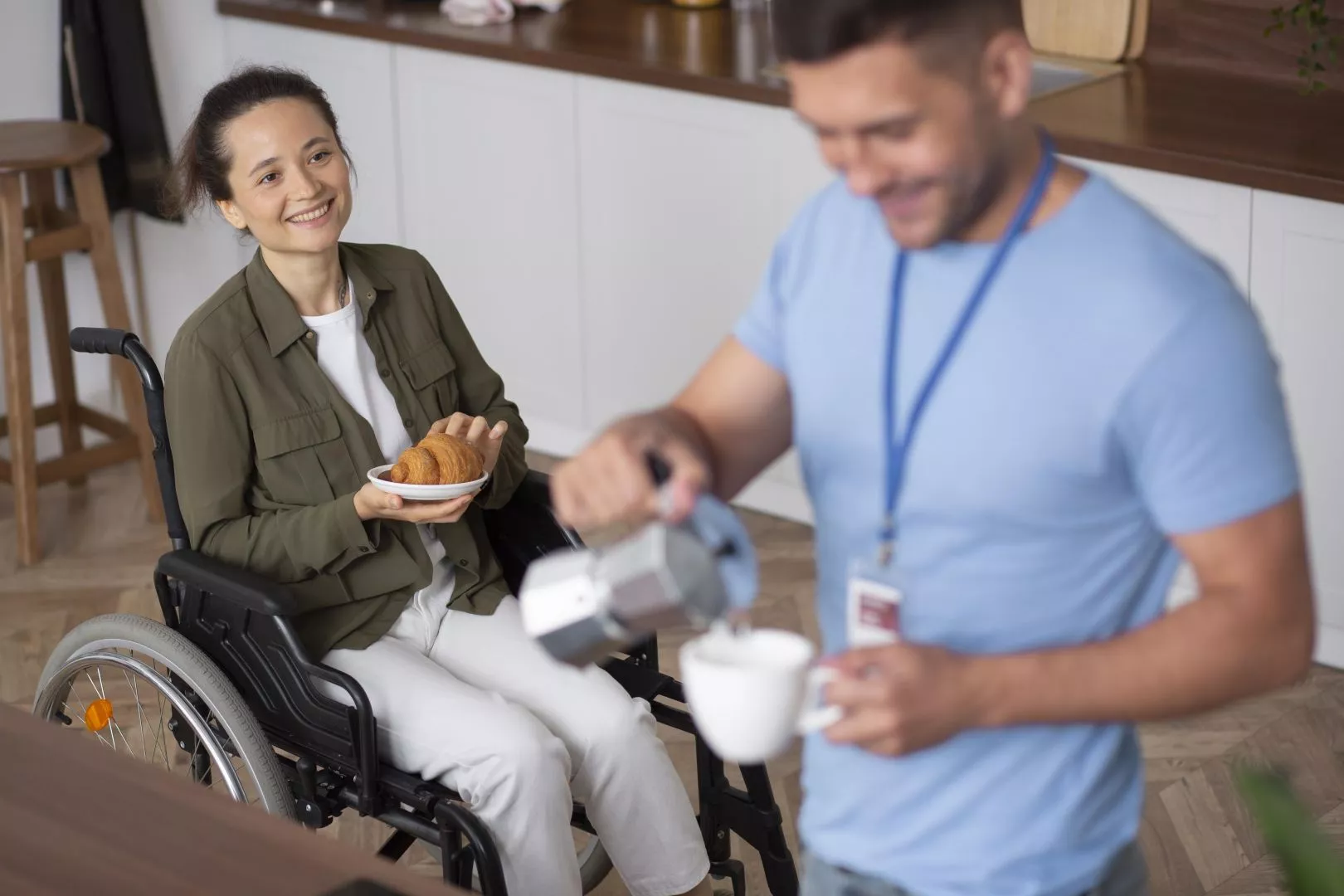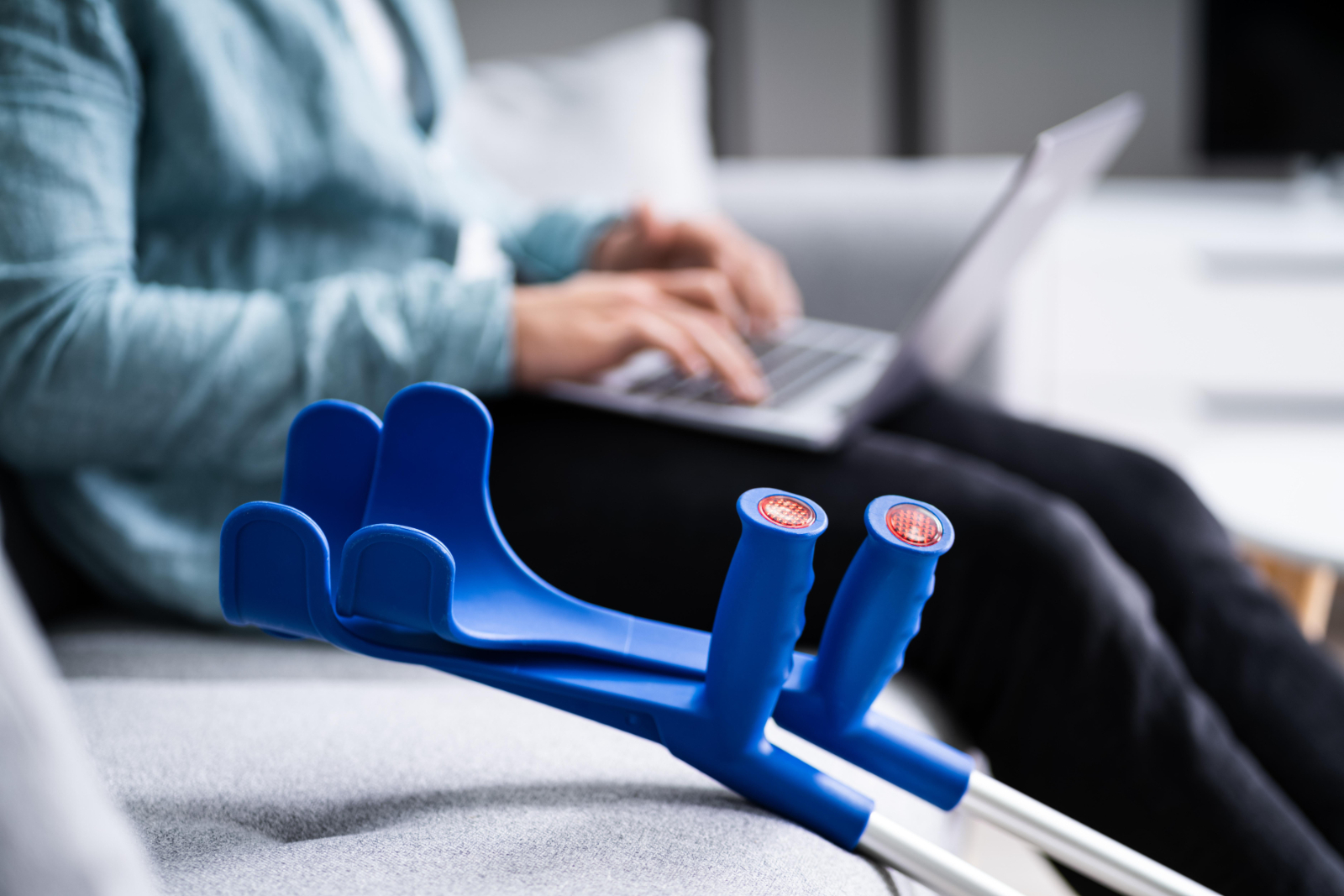We explore support for physical disability private care in the UK. We offer insights into the options available for private care and how to access them.
What is involved in setting up physical disability care at home?
Setting up care at home for individuals with physical disabilities is a meticulous process requiring careful thought and planning. The initial step in this process implicates a thorough evaluation of the person's specific needs. Conducting a complete assessment by a healthcare professional ensures that the care and support services offered are customised to cater to the unique needs of each individual.
Consequently, a personal care plan is outlined to channel the required services suitably. Private Care and Support for Physical Disabilities in the UK typically embodies a myriad of assistance. Such support often encompasses assistance with everyday tasks like bathing, dressing, and preparing meals.
It also involves providing physical therapy, managing medication, and facilitating transport for medical appointments or leisure activities. Where there are substantial mobility concerns, modifications to the home may also be essential. Such adjustments could range from installing ramps and lifts for smooth movement to adapting the bathroom and living spaces for better accessibility.
Depending on the person's condition, equipment such as wheelchairs, hoists and other mobility aids may be needed. However, in-home care is not solely about catering to physical needs. Emotional support plays a key role as well, striving to provide individuals with a high-quality, independent life within the comfort of their own homes. This approach reinforces the aspiration that overall welfare entails both physical and emotional well-being.

Is physical disability care at home the right option for me/my family?
Choosing Physical Disabilities Private Care and Support in the UK may be a pivotal decision that alters the lives of individuals and their families.
One of the main advantages of in-home care is the cosy familiarity of being surrounded by one's own home environment, which can significantly boost overall mental well-being and independence.
Picking out home-based care is especially beneficial for people living with severe physical disabilities.
The tailored help offered delivers them with the necessary care and support, whilst also encouraging them to stay active within their local community and keep up with their already established social relationships.
Nevertheless, it's key to acknowledge that providing care at home for someone stricken with a physical disability can pose challenges for families.
Taking on this responsibility can prove to be emotionally strenuous and physically draining, particularly for those juggling work and other commitments concurrently. Hiring a dependable care provider eases this hefty burden, ensuring appropriate care is provided while also affording families some much-needed downtime. Understanding the individual needs, expectations and family dynamics of disability care plays a significant part in determining the suitability of in-home care.
It is always recommended to speak and discuss these careful considerations with a healthcare professional or a trusted care adviser. Such dialogue can help guide families and individuals in their decision-making process, ensuring that the chosen solution is not only effective but also matches the lifestyle and specific care requirements of its beneficiaries.
In the UK, this choice is important as it brings with it the promise of improved life quality, emotional well-being, increased independence and the comfort of a familiar environment for those living with physical disabilities. It's a decision that should be made thoughtfully with careful consideration of the individual's needs, and the support of a reliable care provider. This way, it can be ensured that the right choice is made, leading to enhanced care provision and positive outcomes for the individual concerned.
How much does in-home physical disability care cost?
The cost of Physical Disabilities Private Care and Support in the UK is subject to variation. This fluctuation hinges on the severity level of the disability and the degree of care needed. Each individual's requirements are unique, and in a similar manner, the expenses linked with their particular methods of care differ. Typically, care providers present various services which are compiled into distinct packages. The expense of these services depends on several diverse elements.
These include how long the care is provided, the nature of the care, and the specific conditions required by the individual. In certain circumstances, there could be financial resources readily accessible through governmental bodies or unique charities. These funds can potentially offset some, if not all, of these costs. It is of paramount importance to consider the financial commitment when contemplating investing in in-home care.
However, the decision must be balanced against the unequalled advantages that can be gained. The emphasis of this care is to allow an independent lifestyle that prioritises comfort for the individual in need.
Employing in-home care, no matter the cost, can provide priceless benefits for individuals with physical disabilities, often enhancing their overall quality of life in their familiar surroundings. Hence, while cost can be an essential factor, the value behind what is being provided should also be correctly appreciated when considering physical disability private care and support needs.


What are the key elements of live-in physical disability care?
Physical Disabilities Private Care and Support service in the UK is devoted to delivering all-embracing care within the household environment. This support scheme aims at individuals who battle with physical disabilities but prefer the comfort of their home over the unfamiliarity of medical facilities.
One of the significant aspects of live-in physical disability care is personal care. This entails maintaining respect for the person's dignity and autonomy, while aiding with activities like bathing, dressing, and maintaining personal hygiene. Personal care plays an integral role in boosting the individual's confidence and ensuring they feel self-sufficient wherever possible.
Furthermore, support is offered for daily living chores. This includes assistance with regular tasks such as meal preparation, performing household tasks, and even running daily errands. The aim is to ensure the individual is not overwhelmed and can live an organised, stress-free life. A particularly key component is professional medical help. The caregiver possesses adequate knowledge to manage medication routines, and if the situation dictates, they can utilise specialised equipment.
In numerous scenarios, physical therapy is incorporated within the care plan with an ambition to enhance mobility and to optimise physical function. Lastly, a significant part of the package is the companionship provided by the live-in caregiver. This plays a critical role in fostering emotional well-being. The caregiver encourages social interaction, engages the individual in activities based around their hobbies, and lends emotional support whenever necessary.

What are the benefits of live-in physical disability care?
Physical Disabilities Private Care and Support is a significant service offered in the UK that benefits people with physical impairments immensely. This service is pivotal as it helps in fostering a sense of independence amongst individuals with physical disabilities.
This is achieved by enabling them to live in their homes within an environment that they are both comfortable and familiar with, rather than in care homes or hospitals. Additionally, these services offer personalised care plans that are uniquely tailored to suit the specific needs and preferences of the persons being cared for.
Whether it is assistance with daily chores like cooking and bathing, help with medication or physical therapy, each care plan is carefully designed to improve the recipient's quality of life.
The role of Physical Disabilities Private Care and Support extends beyond the provision of practical assistance - it also provides constant companionship. The caregiver is a steady, comforting presence in the life of the individual, providing reassurance and an invaluable human connection.
This social interaction is crucial in lessening feelings of isolation and promoting a sense of belonging. Pair this with the peace of mind it provides to family members, who can relax knowing their loved ones are in safe hands, and it's clear to see why this service is deeply appreciated. Further, having a caregiver present at all times minimises the risks faced by individuals.
Whether an individual is recovering from an operation, learning to cope with a new disability, or managing a long-term condition, complications can arise at any moment. The constant presence of a caregiver ensures there's help on hand immediately to deal with any unexpected situations that may occur.
We offer specialist home care services and physical disability care for vulnerable adults throughout London. Get in contact today if you have a loved one that would benefit from care at home.

